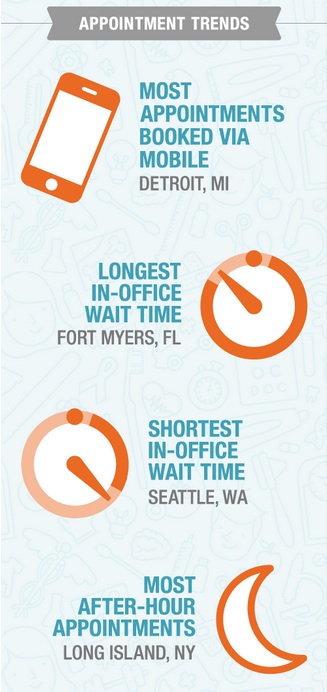 This week, MobiHealthNews wrote about Misfit Shine raising funds, FDA clearance for Sense4Baby and eMotion ECG, and some changes to Medicare and Medicaid telemedicine coverage. But some other big names have been writing about digital and mobile health this week too, whether its weighing in on big stories like 23andMe's face-off with the FDA or exploring how doctors are using apps as clinical reference tools. Here's some stories we're keeping an eye on:
This week, MobiHealthNews wrote about Misfit Shine raising funds, FDA clearance for Sense4Baby and eMotion ECG, and some changes to Medicare and Medicaid telemedicine coverage. But some other big names have been writing about digital and mobile health this week too, whether its weighing in on big stories like 23andMe's face-off with the FDA or exploring how doctors are using apps as clinical reference tools. Here's some stories we're keeping an eye on:
The FDA vs Personal Genetic Testing -- The New Yorker
Should the FDA stop you from scaring yourself with 23andMe's DNA test? -- The Washington Post
A lot of ink has been spilled since the FDA shamed Silicon Valley darling 23andMe in a public letter and 23andMe responded by halting sales of its personal genetic tests. These two pieces look at the events in a larger context, asking the question of what's really at stake in this conflict between 23andMe.
FDA's problem with 23andMe is not the genetic test itself, but 23andMe's interpretation of it -- based on both scientific literature and 23andMe's own database. The Washington Post's Ezra Klein points out that the big data nature of 23andMe might make it impractical for it to get all possible interpretations cleared. The New Yorker's David Dobbs says the FDA needs to find the right level of regulation for these sorts of services, where the medical risk is not in the test itself, but in the actions people might take as a result of it.
"How do we provide the necessary counsel to people opening Pandora’s box without effectively locking it?" he writes. "The FDA has a point: genetic-risk information needs to be reasonably solid, and its recipients need to be properly served; there’s a place for selective paternalism in genetic testing. Yet the agency seems like a poor candidate to strike this balance. The hope is that it will demand documentation confirming 23andMe’s method for the most laden results, and that it will require a better filter—one that’s thinner than a doctor’s visit but thicker than a click."
Sex as Exercise -- The New York Times
Gretchen Reynolds points out that researchers have been trying to pin down the physiological effects of sex since the 1950s. But, interestingly, it's an area where mobile health really shines. Unobtrusive, passive monitoring allows researchers to collect data about sex pretty much as it's experienced in every day life. The most recent research into the topic, conducted at the University of Quebec, used BodyMedia SenseWear armbands to find out how many calories couples burned during sex.
The result? For the 21 heterosexual couples in the study, the men burned about four calories per minute while the women burned about three. The same participants burned 9 and 7 calories per minute, respectively, when jogging. It's interesting to see the BodyMedia device being used for this research, as TechCrunch's Greg Feinstein used that device as an example earlier this year in a piece about how activity trackers could expose infidelity.
ZocDoc’s 2013 US Health Checkup: The Results Are In! -- ZocDoc Blog
Mobile doctor's appointment booking company ZocDoc published its latest aggregated data from customers to mark the end of the year. ZocDoc shared a lot of interesting localized data: Patients in Detroit make the most appointments via mobile and the most cosmetic appointments, whereas patients in Northern New Jersey give their physicians the highest ratings, but those doctors are most likely to be dietitians and nutritionists.
ZocDoc also broke down the data into men and women, finding that women left more comments about their doctors, but men left more ratings. The most popular appointment time for men was 10 am on a Friday, whereas women were most likely to choose 2 pm on a Monday. Other data might be more useful for ZocDoc customers. For instance, Tuesday is both the most popular day for scheduling doctors' appointments and the day on which last minute openings are most likely to appear and January is, perhaps not unexpectedly, the most popular time of year for doctors' appointments.
Digital doctors: how mobile apps are changing healthcare -- The Telegraph
Meanwhile, across the pond, the Telegraph's Sophie Curtis wrote about how doctors are increasingly turning away from physical health libraries to subscription-based apps like Wolters Kluwer's UpToDate. Curtis talks about how patients respond to doctors using iPads in the office -- typically positively, especially when the doctor explains to the patient exactly what he or she is using the app for. Doctors even find the apps more accurate than old paper reference materials, in matters of drug interactions, for instance.
The article wraps up by mentioning some other cutting edge innovations that make reference apps look "relatively low-tech," including remote vitals monitoring with wearable sensors and the use of Google Glass in surgery.














